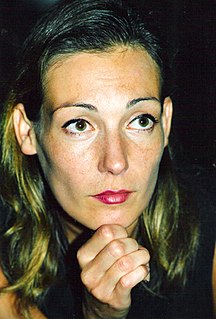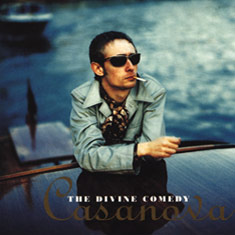
The Threepenny Opera is a "play with music" by Bertolt Brecht, adapted from a translation by Elisabeth Hauptmann of John Gay's 18th-century English ballad opera, The Beggar's Opera, and four ballads by François Villon, with music by Kurt Weill. Although there is debate as to how much, if any, Hauptmann might have contributed to the text, Brecht is usually listed as sole author.

Edward Neil Anthony Hannon is a Northern Irish singer and songwriter. He is the creator and front man of the chamber pop group The Divine Comedy, and is the band's sole constant member. Hannon wrote the theme tunes for the television sitcoms Father Ted and The IT Crowd.

The Divine Comedy are a pop band from Northern Ireland, formed in 1989 and fronted by Neil Hannon. Hannon has been the only constant member of the group, playing, in some instances, all of the non-orchestral instrumentation except drums. To date, twelve studio albums have been released under the Divine Comedy name. Between 1996 and 1999, the band released nine singles that made the UK Top 40, including the top-ten hit "National Express".

Noel Scott Engel better known by the stage name Scott Walker, was an American singer-songwriter, composer and record producer who resided in England. Walker was known for his baritone voice and an unorthodox career path which took him from 1960s teen pop icon to 21st-century avant-garde musician. Walker's success was largely in the United Kingdom, where his first four solo albums reached the top ten. He lived in the UK from 1965 and became a UK citizen in 1970.

Destroyer is the fourth studio album by American hard rock band Kiss, released on March 15, 1976 by Casablanca Records in the US. It was the third successive Kiss album to reach the top 40 in the US, as well as the first to chart in Germany and New Zealand. The album was certified gold by the RIAA on April 22, 1976, and platinum on November 11 of the same year, the first Kiss album to achieve platinum. The album marked a departure from the raw sound of the band's first three albums.
The "Alabama Song"—also known as "Moon of Alabama", "Moon over Alabama", and "Whisky Bar"—is an English version of a song written by Bertolt Brecht and translated from German by his close collaborator Elisabeth Hauptmann in 1925 and set to music by Kurt Weill for the 1927 play Little Mahagonny. It was reused for the 1930 opera Rise and Fall of the City of Mahagonny and has been recorded by the Doors and David Bowie.

Ute Gertrud Lemper is a German singer and actress. Her roles in musicals include playing Sally Bowles in the original Paris production of Cabaret, for which she won the 1987 Molière Award for Best Newcomer, and Velma Kelly in the revival of Chicago in both London and New York, which won her the 1998 Olivier Award for Best Actress in a Musical.

Liberation is the second album by Irish chamber pop band the Divine Comedy, released in 1993 by Setanta Records.

Casanova is the fourth studio album by Irish chamber pop band the Divine Comedy, released in 1996 by Setanta Records. It was the band's commercial breakthrough and was certified Gold in the UK in July 1997, aided by the release of the album's first single, "Something for the Weekend", which reached No. 13 on the charts. Two other singles released from the album, "Becoming More Like Alfie" and "The Frog Princess", charted at No. 27 and No. 15, respectively.

Scott Walker: 30 Century Man is a 2006 documentary film about Scott Walker. The film gets its title from the Scott 3 song "30 Century Man". It is directed and co-produced by Stephen Kijak, with Grant Gee serving as director of photography. It charts Walker's career in music, with a focus on his songwriting, and features exclusive footage of recording sessions for his most recent album, The Drift including a memorable sequence in which Walker oversees the recording of the punching of a joint of pork, for the percussion on the song Clara. Rock legend David Bowie, who often professed to having been inspired by Walker, acted as executive producer of the film. Actor Gale Harold is one of the associate producers.

Scott 2 is the second solo album by Scott Walker, released in 1968 by Philips Records in the UK and Smash Records in the US. Featuring the minor hit "Jackie", it arrived at the height of Walker's commercial success as a solo artist, topping the UK Albums Chart.

The World Is Not Enough is the 1999 soundtrack of the 19th James Bond film of the same name and the second Bond soundtrack composed by David Arnold. The score features more instances of electronic music, which Arnold included to "make the thing a little more contemporary". To add an ethnic flavor to tracks that conveyed the film's Turkey and Central Asia setting, Arnold brought in percussionist Pete Lockett, qanun player Abdullah Chhadeh, and singer Natacha Atlas.

A Short Album About Love is the fifth studio album by Irish chamber pop band the Divine Comedy, released in 1997 by Setanta Records. It was recorded on 20 October 1996 at Shepherd's Bush Empire, London.

1001 Albums You Must Hear Before You Die is a musical reference book first published in 2005 by Universe Publishing. Part of the 1001 Before You Die series, it compiles writings and information on albums chosen by a panel of music critics to be the most important, influential, and best in popular music between the 1950s and the 2010s. The book is edited by Robert Dimery, an English writer and editor who had previously worked for magazines such as Time Out and Vogue.

The Michael Nyman Songbook is a collection of art songs by Michael Nyman based on texts by Paul Celan, Wolfgang Amadeus Mozart, William Shakespeare and Arthur Rimbaud. It was recorded as an album with Ute Lemper in 1991, and again as a concert film in 1992, under the direction of Volker Schlöndorff, again with Ute Lemper, though many of the musicians had changed. The songs have been recorded by others and as instrumentals, and are published by Chester Music. The album has been issued by both London Records and Argo Records, though the covers are the same except for the logo.

"National Express" is a song by the Divine Comedy. It was released as the third single from the album Fin de Siècle and reached number eight on the UK Singles Chart and number 18 in Ireland. The song is based on Neil Hannon's observations of life from the window of a National Express coach.
"Pirate Jenny" is a well-known song from The Threepenny Opera by Kurt Weill, with lyrics by Bertolt Brecht. The English lyrics are by Marc Blitzstein. It is probably the second most famous song in the opera, after "Mack the Knife".

"The Saga of Jenny" is a popular song written for the 1941 Broadway musical Lady in the Dark, with music by Kurt Weill and lyrics by Ira Gershwin, considered now as a blues standard.

"My Ship" is a popular song written for the 1941 Broadway musical Lady in the Dark, with music by Kurt Weill and lyrics by Ira Gershwin.
Peter Walsh is a British record producer and engineer.
















